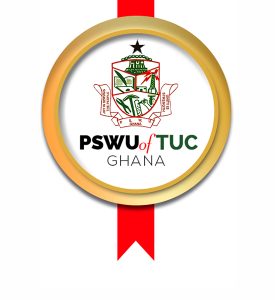Public Services Workers' Union
of TUC (Ghana)
The Public Services Workers' Union of Trades Union Congress (Ghana), “PSWU” for short, initially called the "Government Clerical and Technical Workers" Union was conceived on June 22, 1959 at Broadcasting House, Accra as a result of the merger of four (4) House Unions, namely; the Ghana Broadcasting Corporation, Customs, Excise and Preventive Service, Meteorological Department and Produce Inspection Unions, with two thousand (2,000) members.
The Union over the decades had its fair share of challenges with leadership, membership and finances amongst others. This notwithstanding, it is one of the most stable, dynamic and vibrant Unions in the Country. It has incorporated significant affirmative decisions into the decision-making structures of the Union, including the establishment of Women’s Committee since 1993, and the Youth Committee in 2014, of which the Union was among the first within the TUC (Ghana) affiliates to take such decisions
Presently, the PSWU represents about twenty-seven thousand (27,000) members with over eighty thousand (80,000) associate members from the Ghana Government Pensioners' Association
The Union's membership is spread over sixty-five (65) Public Sector Institutions otherwise known as Divisions. The presence of the Union is felt in all the administrative regions and almost in the entire Metropolitan, Municipal and District Assembly areas in Ghana. The Union is duly registered as a corporate body and holds Bargaining Certificate for all member organizations. The Union is governed by its Constitution and Internal Regulations.


Our Strategic Focus
The PSWU is currently implementing a Strategic plan (2020-2023) with the aim of enhancing the effectiveness of its operations. The plan focuses on eight strategic issues as follows:
- Membership growth
- Education and Training
- Gender and Youth Mainstreaming
- Developing Strategic Management Systems
- Delivery of timely and quality service
- Information and Communication Technology (ICT)
- Efficient Financial Management
- Social Protection and Membership Welfare
